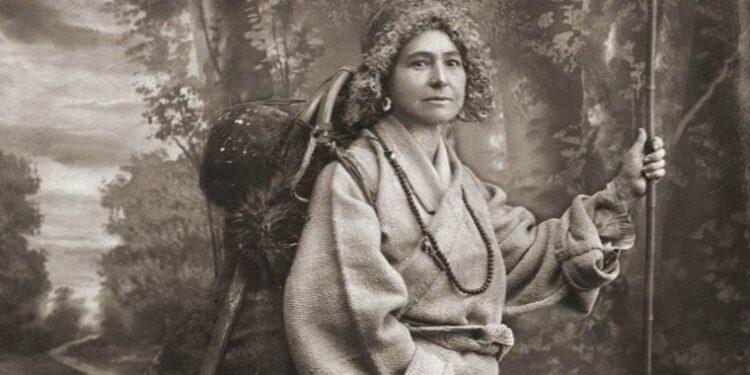Contents
Questo articolo è disponibile anche in:
There are many types of travel in the world: there are those who travel to enjoy the numerous types of tourism, those who seek adventure far from home, immersing themselves in a new world and a new culture. But, more than a century ago, in 1868, an extraordinary woman who made traveling her reason for living was born: the Belgian-French writer and explorer Alexandra David-Néel.
Famous for his numerous expeditions to India and especially to Tibet, where she reached undercover Lhasa, a city at the time forbidden to foreigners, David-Néel lived each of her journeys to the full, learning habits, customs and traditions. Those informations have come down to us in the written form of letters, essays or as actual travel reports, revealing a unique and innovative point of view. But who was this woman with an extraordinary life?
Alexandra David-Néel’s early years: an irrepressible desire to travel
The great passion of the Belgian-French traveler was visible from a young age. Just fifteen years old, she ran away from Belgium, where she was on holiday with her family, to Holland with the aim of reaching England: she was stopped by the lack of money. At eighteen, she eventually left her family, leaving for Switzerland, Spain and, finally, England: there she frequented the library of the British Museum not only to learn the language, but also to get closer to Orientalism.
The turning point in David-Néel’s life came shortly after she was twenty, precisely between 1890 and 1891. It was the moment in which, probably thanks to the inheritance of a large inheritance, she left for India for the first time. Fascinated by the culture of the place, she approached meditation techniques and met in Varanasi the one she defined her spiritual master, Swami Bhaskarananda Saraswati: such was the fame of this historical figure that his presence is even mentioned in the travel report Following the Equator, written by Mark Twain.
Opera singing: a travel and sustenance means
The trip to India leaves a profound mark on the very young Alexandra David-Néel, who promises to return as soon as possible. Between the first trip to the East and the second, however, almost twenty years passed: a long period of time which, however, didn’t stop the protagonist of this story.
One of the qualities of this extraordinary woman, in fact, was her singing: on the advice of her father, she studied at the Royal Conservatory of Brussels. This allowed her to work at the Hanoi Opera, then moving to Athens and finally to Tunis, where she became artistic director.
Tunis becomes a new home for the woman: it is there that she meets and marries the railway engineer Philippe Néel. The relation between the two, due to Alexandra’s frequent travels, was turbulent. Despite this, there was mutual respect and Philippe supported the desire for independence that characterized his wife.
From India to Tibet: a journey of fourteen years
The separation between Alexandra and Philippe occurred soon: in 1911, now 43 years old, the woman left again for the East, to remain there until 1925. There were many historical figures that Alexandra David-Néel met during her long stay: she became , for example, “spiritual sister” of Prince Sidkeong Tulku Namgyal, a well-known scholar and polyglot.

Not only that, it was during this expedition that she met a young boy, Aphur Yongden. This figure becomes very important for Alexandra: he became her life and travel companion, and even was adopted by David-Néel herself as her son.
Despite the many experiences accumulated over the years, the objective of the Belgian-French traveler’s long journey to the East became more evident day by day: reaching Tibet. An impossible dream: if not for the well-known climatic conditions of the place, travelers were stopped by the harsh laws that closed the doors to foreign visitors.
This dream, however, became more and more a possibility over the years. Multiple factors were complicit: for example, the loss in 1914 of her dear friend Sidkeong Tulku Namgyal, who had become monarch of the Kingdom of Sikkim for a few months, a period during which the traveler was to all intents and purposes her personal advisor. Having left no heir, Sikkim passed to her half-brother, who removed Alexandra from her palace.
The incognito journey to Lhasa
Alexandra David-Néel and Yongden trespassed into Tibet for the first time, from Sikkim, in 1916. The wonderful experience, crowned by the meeting with the Panchen Lama, ended with an expulsion order from the English colonial authorities, as they were guilty of having ignored the established laws.
This, however, did not happen: in the meantime, First World War had broken out in Europe, and traveling to one’s country of origin was impossible. David-Néel and Yongden then chose to move towards Japan: the meeting with the philosopher Ekai Kawaguchi was essential, who told them how, in disguise, he spent a year and a half in Lhasa, one of the most important cities in Tibet.
Inspired by this story, Alexandra and Yongden moved first to Korea and then to China, which they crossed from east to west disguised as beggars: in 1924, they arrived in Lhasa, together with a group of pilgrims, and stayed there for at least two months before they were discovered due, as narrated in subsequent letters, to the woman’s habit of going to the river every day to wash, which was not common in the area.
However, before the authorities action, the two travelers had already left Lhasa. Their economic situation, however, began to get out of hand: from fake beggars, Alexandra and Yongden soon found themselves in real need of help, seeking shelter from house to house during the long road to Northern India, from which they left for France.
From 1937 to 1969: traveling until the end
Although in her seventies, age did not keep Alexandra David-Néel from returning once again to the East. She left for China, she revisited Tibet again, where she remained for five years, and she saw India for the last time. There, in 1941, she was reached by the news of her husband’s passing: reports from the time tell of strong emotions felt by the woman.
In 1946, she returned to France and went to live in Digne-les-Bains: here she began a long activity as an author, narrating her experiences during her numerous expeditions. In 1955, at the age of 87, she suddenly lost her adopted son. Finding herself alone, the figure of Marie-Madeleine Peyronnet became prominent: she was her personal secretary, her confidant and often described at the same time as “a daughter who watches over her mother” and “a disciple at the service of her guru.”
In 1969, at the age of one hundred, Alexandra David-Néel renewed her passport once again, awaiting a new adventure. On 8 September 1969, at the age of one hundred and one, the life of Belgian-French traveller ended. Her ashes, however, traveled once again in 1973 to Varanasi, to be scattered together with those of her adopted son in the Ganges, in the place where she, in her early twenties, began her explorations of the East.
A story, therefore, very long and full of adventures, which has reached the present day thanks to the numerous writings on which, until the last days of her life, almost blind and bent by her age, she continued to work. A narrative that becomes a true source of inspiration for all those who decide to explore the beauties of the world, making it their reason for existence, following the example of an exceptional woman who, more than a century ago, transformed her life in a wonderful adventure.


















